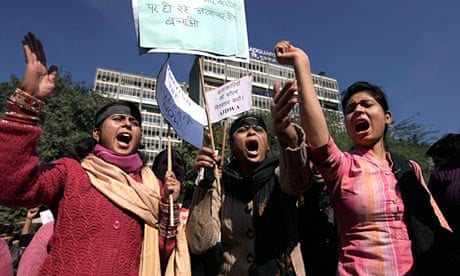A young woman who was gang-raped on a moving bus in Delhi and left with severe internal injuries has been flown to a Singapore hospital for treatment that could last several weeks, officials said.
The 23-year-old student, who is in a critical condition, arrived in Singapore in an air ambulance and was admitted to the Mount Elizabeth hospital, renowned for multi-organ transplant facilities.
The hospital said in a statement that she was admitted to the intensive care unit "in an extremely critical condition". It said "she is being examined and the hospital is working with the Indian High Commission."
The 16 December rape of the woman and her brutal beating triggered widespread protests in New Delhi and other parts of the country and sparked calls for the death penalty for the perpetrators of rape. It is punishable by up to life in prison. All six suspects in the case have been arrested.
The rape has highlighted the extensive harassment that Indian women face daily in cities and towns, ranging from unwanted hands being placed on them to being blamed for causing the sexual violence. Even rape victims rarely come forward to complain because of the social stigma. Many women say they have structured their entire lives around protecting themselves and their children, and restricting their movements to avoid being molested.
The nearly daily protests in the heart of New Delhi following the rape have been frequently quelled by police using teargas and water cannons. One policemen died of injuries suffered in the clashes.
In a written statement, the Indian high commission said it has received "many offers to help" the woman, who is "receiving full medical attention". Her family was also being provided all assistance, it said.
Police said she was travelling with a male friend in a bus when they were attacked by six men who took turns to rape her. The men also beat the couple with iron rods, stripped them of their clothes and threw them off the bus on a road. They were found by bystanders before being rushed to New Delhi's Safdarjang hospital. The bus, which was empty except for the attackers and the couple, drove through the city for hours during the assault, even passing through police checkpoints.
The Press Trust of India quoted a hospital medical superintendent, BD Athani, as saying the woman suffered severe intestinal and abdominal injuries. She underwent three surgeries and parts of her intestines were removed, he said.
He said the Indian government, "based on the advice of a team of doctors," made arrangements for her to be shifted to Singapore's Mount Elizabeth hospital because it has state of the art multi-organ transplant facilities. Also, the travel time of 5.5 hours from New Delhi was considered less arduous.
"With fortitude and courage, the (woman) survived the aftereffects of the injuries so far well. But the condition continues to be critical," he was quoted as saying. "The treatment (in Singapore) might take longer."
The woman was on ventilator support during the 10 days she was at Safdarjang hospital.
The Press Trust of India said the Indian government will bear all expenses of the woman's treatment. Doctors have described her as "psychologically composed and optimistic about future".
It said her condition worsened late on Wednesday after her pulse plummeted briefly, and that periodic bouts of infection were also a source of concern.
